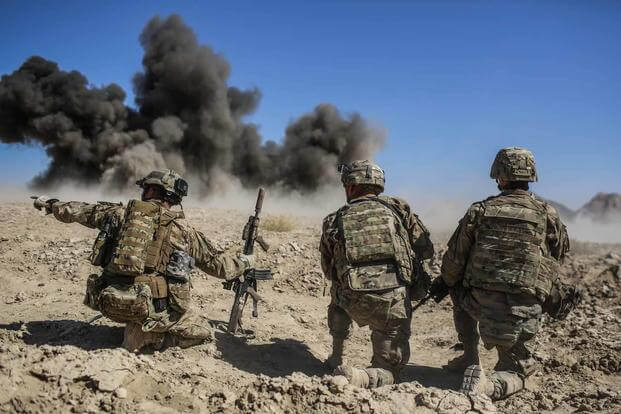The U.S. Army announced Friday that it is shutting down two of the specialized organizations it stood up after the 9/11 attacks to quickly identify and perfect new tactics and equipment for combat units.
The "discontinuation" of both the Asymmetric Warfare Group (AWG) and the Rapid Equipping Force (REF) is occurring because the Army is transitioning from counterinsurgency operations to a focus on multi-domain, large-scale combat operations, according to a brief news release.
Read Next: At Least 4 Top Generals May Have Been Exposed Before Trump Tested Positive for COVID-19
"The Army established these units to rapidly identify material and non-material solutions to operational challenges encountered during the counterinsurgency fight in Afghanistan and Iraq," according to the statement. "As our focus changes to great power competition and large-scale combat operations, Army analysis indicated that the personnel and resources could best be utilized in building the operational fighting force."
Army Times was first to report the story.
Most recently, the AWG led the Army's effort to train combat brigades in subterranean warfare. That effort began in 2018 when the service budgeted $572 million to train the majority of its brigade combat teams to fight in large-scale underground facilities that exist beneath dense urban areas around the world.
Former Special Operations Command AWG members developed new tactics in underground breaching and small-unit operations at the organization's Asymmetric Warfare Training Facility at Fort A.P. Hill, Virginia.
The Army has not yet decided how it will use the specialized A.P. Hill facility or the AWG's headquarters at Fort Meade, Maryland.
"The Army is currently determining the final disposition of the facilities," a service spokesman told Military.com in an email.
The Fort Belvoir, Virginia-based REF has been a significant player in the Army's counter-drone effort. The REF has fielded anti-drone systems, such as Battelle's DroneDefender, which can be aimed like a rifle, and Radio Hill Technologies' radar gun-like Dronebuster to help protect units from small, commercial-style unmanned aerial systems that can easily be armed with homemade bombs.
Personnel and resources from both organizations will be reallocated to the operational force, according to the release. Both organizations will be fully deactivated by Sept. 30, 2021.
The service said it plans to "ensure the value of the organization's work over the past 14 years is not lost" by maintaining the lessons learned at the Army Combined Arms Center by organizations such as Center for Army Lessons Learned, according to the release.
-- Matthew Cox can be reached at matthew.cox@military.com.
Related: Army Is Spending Half a Billion to Train Soldiers to Fight Underground












